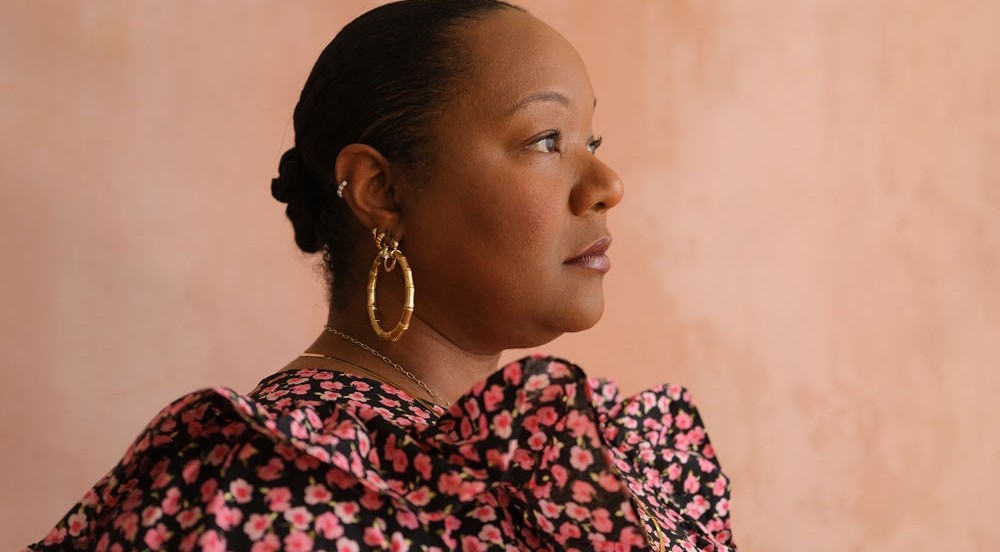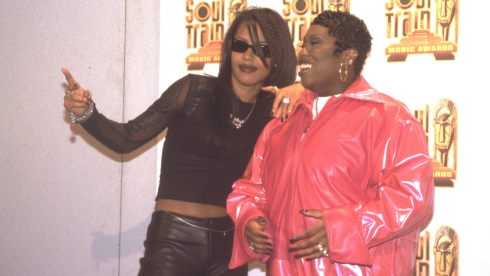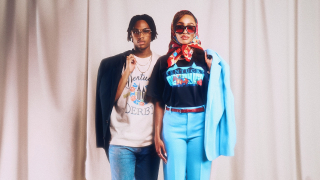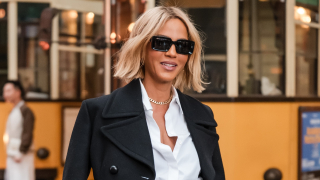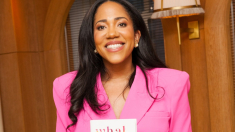The beauty of filmmaking is that it invites the viewers to imagine an alternate reality from the one they currently exist in. Whether it prompts deep introspective reflection or inspires others to take action, the power of film cannot be understated. As filmmakers and actors continue to fight for their rights as individuals who create many bodies of work that we consume and enjoy, spaces for visibility— like ones curated by Maori Karmael Holmes— are important.
Through the founding of BlackStar Projects and the BlackStar Film Festival, she has been able to build an outlet for indie filmmakers and cultural producers to feel seen and valued.
As the event embarks upon its 12th year of existence on August 2-6, 2023, Holmes spoke with EBONY about the importance of uplifting indie filmmakers and curating an inclusive lineup for the festival.
EBONY: You were awarded the 2023 Berresford Prize. What does this accomplishment mean for you and what doors will it open?
Maori Karmael Holmes: The Berresford Prize is a new award, and I was actually on a committee the first year they gave this award out. I remember being so amazed by its existence because so often people who are cultural producers and curators get overlooked. This happens not by their peers but by award systems because they're designed for artists. So often, the people creating platforms and spaces for the artists don't always get acknowledged. I recall thinking it was so brilliant for them to create this prize. I'm shocked that I was nominated and chosen. At this point, I think I'm the fifth person to be awarded, and I'm overwhelmed and excited about it.
I think in terms of what it opens up—I don't know yet. There are circles in which everyone knows about the work that I do. Then, there's still so many circles in which no one knows. So I do hope that the prize increases awareness of not only my work, but the work that BlackStar is doing in general. By that awareness, we're just able to support our artists even more and dive more deeply into the work. As a curator, in addition to BlackStar Film Festival as a project, hopefully there are more opportunities to do shows in other spaces nationally and internationally. That's what I think it opens up. I'm pleased to know that what I've been doing is not invisible.
What do diverse voices in storytelling via film need the most access to in this space?
Filmmaking is a really challenging art form and that it requires so many other people—you need actors, a director of photography and more. It becomes a very expensive practice. What people need more than anything is opportunity. Of course, that opportunity is often linked to resources of funding. For some corporations, what's needed most is presenting the opportunity to access cameras and studio sets.
The moving image is such a powerful medium in terms of the ways that we take it into our spirits. All art is important, but when you see and hear something, it feels real to you. When people watch something on screen, and they watch how people interact with one another, it changes the way our brains work. I think about being in college and seeing music videos in the mid 1990s, and it changed how we wanted to party. With that kind of power, we need as many kinds of voices contributing to it as possible. It becomes very easy to create propaganda and have people think that they're not welcome. If only one kind of person is able to tell a story or one kind of person is green-lighting the story, we get these narrow viewpoints. The whole reason I've been interested in this space to begin with was because I knew there were people whose work was being overlooked—that continues to happen. In the last five years, there has been an explosion of interest and shifts so some of these things are changing but the test is if they last. We thought laws had changed, and we've seen that they've reverted. We should exist everywhere—in period pieces to mumble core indies. There should be Black, Brown, Indigenous and others in all of these spaces.
What does BlackStar provide that others don’t?
We're interested in pushing the boundaries of what the forum can do. That's something I think we do differently than a lot of other festivals. We're not following the "Hollywood formula" and we want to show that. There are other festivals that do that really well, though. We want to be funky and weird.
Additionally, the BlackStar Film Festival has always had a social justice mandate. We're interested in not only thinking about race—which is incredibly important—but race as an intersectional problem that goes with climate change, gender justice, economic justice, differently abled folks, people who are immigrants, and those who have different statuses within our society. We question how art can help amplify those issues and shift policy. We've also engaged in the ways which we can be global since the very beginning. The festival started out as an African Diaspora festival, but then so many other groups of people wanted to be a part of it. So, we expanded our mission because we're all connected. People of the global majority should be looking at ourselves like that, not as minorities.
As a curator, filmmaker, and writer, as well as founder and Chief Executive & Artistic Officer of BlackStar Projects, what energizes you most about the work you do?
I really like that the act of curating, which is finding work and making connections between those works between artists and then presenting it to the world to help other people make those connections of their own. That excites me. That's why I started the festival. I'm always amazed at the connections that happen in the screenings or in other projects in our filmmaking lab and seminar. The act of convening with people who find their folks at the spaces that we create feels great.
As an organization that supports and uplifts indie filmmaking and storytelling, what ways do you hope to continue manifesting the future of BlackStar Projects and film festival?
I hope that the festival continues to be able to exist. We are still in our 12th year fighting to prove to people that we matter. There are folks on the industry side that don't see the value of what we do. That affects things like premieres and how people share their work with you. But I think what we do really well is connecting our audiences to the work, so I look forward to us being able to continue to do that.




